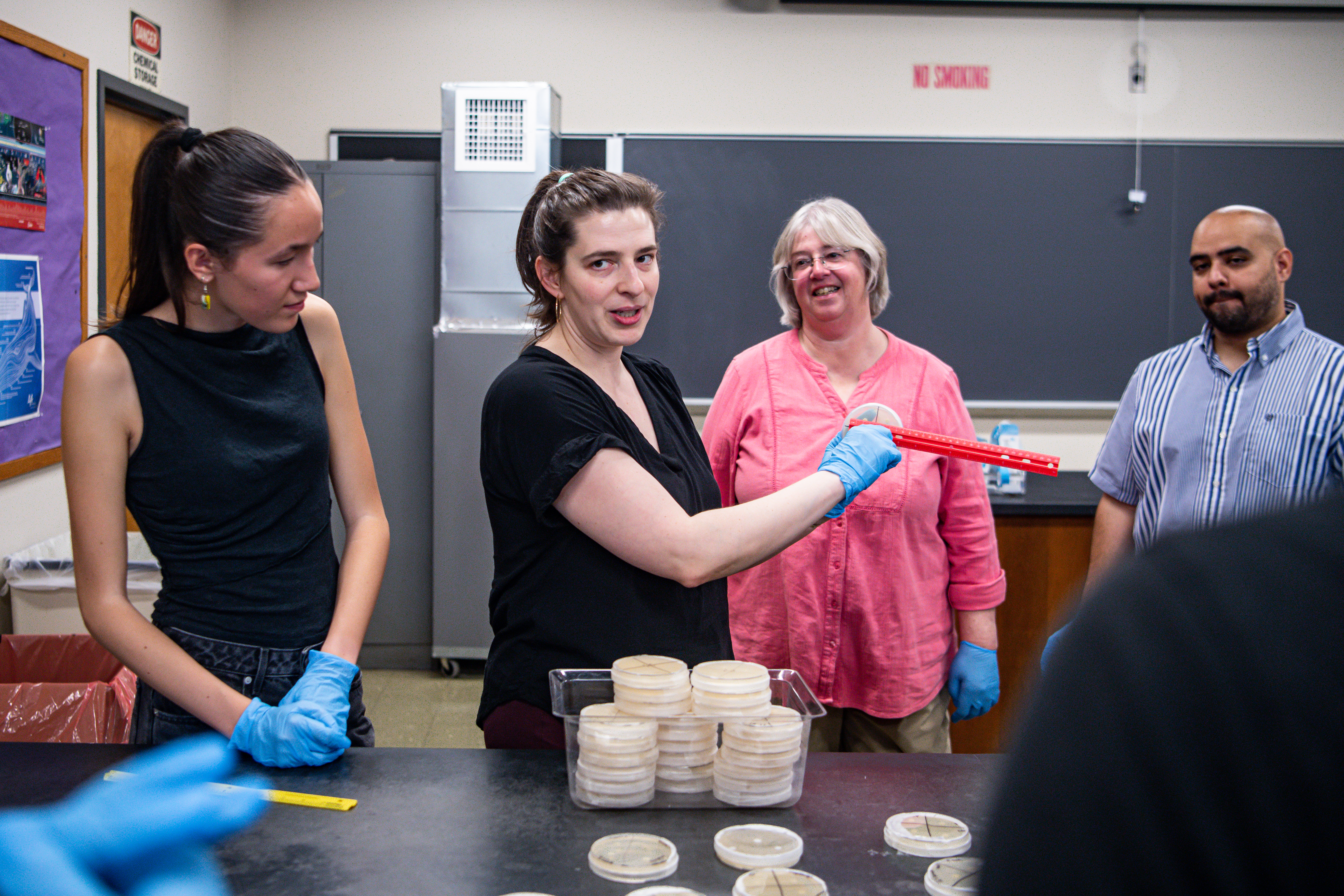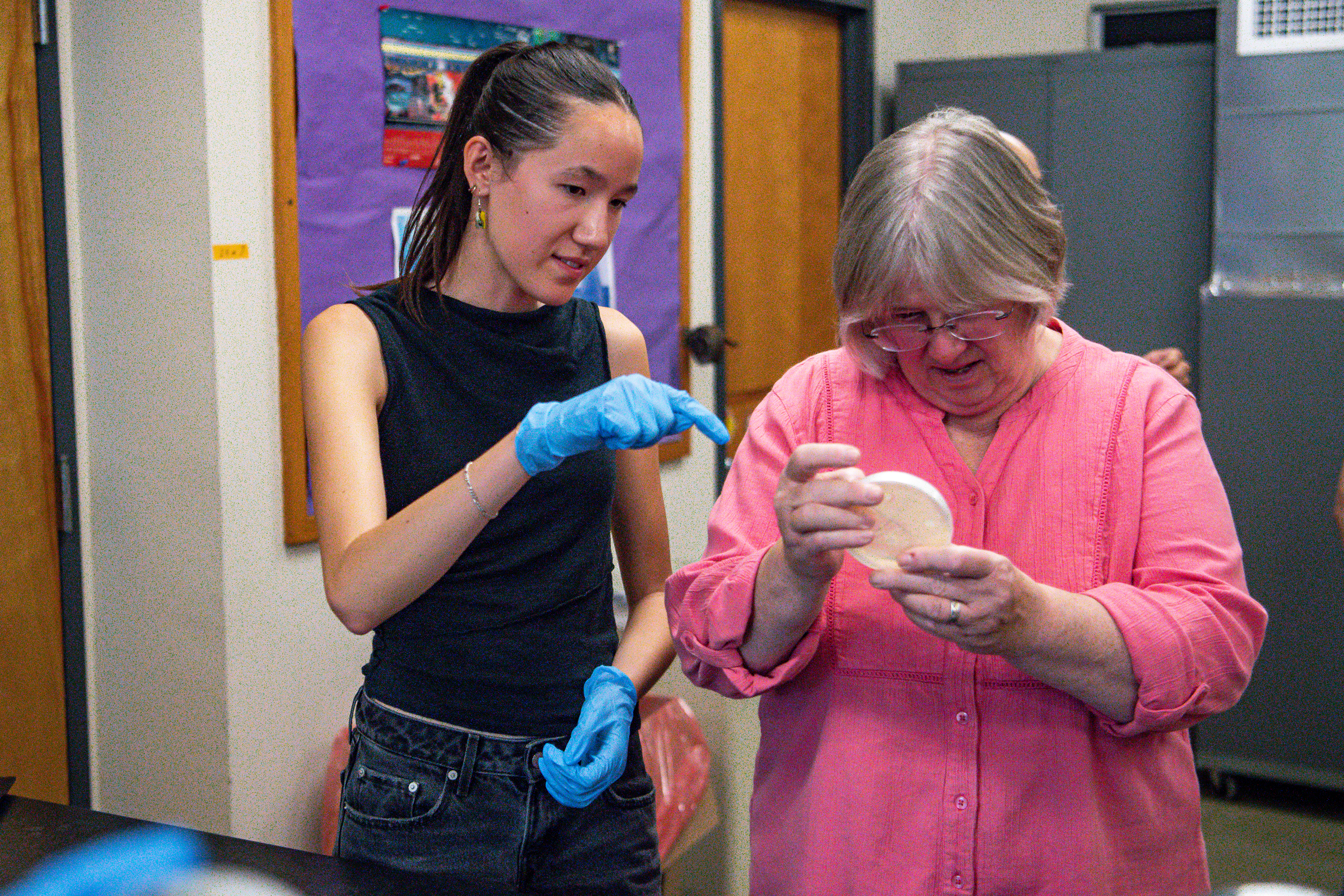Learning Assistants Program a “Win-Win-Win” for Students and Faculty
By Chelsea Feinstein
Since 2011, the Learning Assistants (LA) program has been placing undergraduate students in Boston University lab courses to help improve student learning. Now, some students in the College of General Studies are getting the benefits of having LAs in their Natural Science courses.
In Fall 2024, CGS piloted the LA program in half of the lab sections of NS201, the introductory biology course taken by CGS sophomores. Next fall, the LA program will expand to all NS201 lab sections.
The goal of the LA program is to transform the classroom into a more cooperative and interactive learning environment, according to Lecturer Kristina Luisa Cohen, who proposed adopting the program to CGS leadership. Rather than serving primarily to answer student questions, LAs are charged with encouraging students to think critically to arrive at the answers they are seeking.
“They’re meant to really foster inquiry and collaboration among the student,” Cohen said.

In addition to participating in two lab sections each week, LAs also hold a weekly office hour and participate in Friday prep sessions, where all faculty and LAs gather to go over the lab plans for the following week.
LAs are also required to take a concurrent class in the Wheelock College of Education & Human Development, SC501: Introduction to STEM Education Theory and Practice. The course focuses on teaching practices and methods and prepares LAs to work effectively with students. Students receive a $1600 stipend for participating in the LA program, in addition to being able to take the 2-credit SED course free of charge.
Cohen, who first learned of the LA program when she was a graduate teaching fellow at BU, said that surveys conducted during the pilot semester showed the program was widely beneficial to all involved.
“For me it seems to be a win-win-win, a win for faculty, a win for the LAs, and a win for students,” Cohen said.
She said that students had more opportunity to engage in the labs and benefitted from having a fellow student to talk to, both about their lab work and their CGS experience at large. The LAs, she said, gain maturity and confidence in addition to deepening their content knowledge. And faculty saw their lab runs more smoothly, enabling students to get better results from their experiments.
Kari Lavalli, Master Lecturer and Chair of the Natural Sciences and Mathematics Division, agreed that the program has been beneficial to all involved.
“It’s a great way for faculty to understand what students struggle with conceptually, as the LAs give us feedback when we run through all of the labs, and allows us to alter our approach to the material to foster better understanding,” Lavalli said. “We had a terrific first group of LAs in Fall 2024 and look forward to those whom we will be working with next fall.”

Lindsay Li-Garrison (’24, SAR’26), a Health Science major, jumped at the opportunity to become an LA after working with one in a physics class she took. She said that having a relatable person to approach with questions is one of the aspects of the LA program that is most beneficial to students.
“At times, I believe students felt more comfortable approaching me rather than the professor if they were worried about judgment or wanted a previous student’s perspective,” Li-Garrison said. “Although professors are the best resource, sometimes the perspective that a previous student brings can be valuable not only for the students, but for the professor, especially if there is any constructive criticism that could improve the lab and overall learning.”
True to CGS’s interdisciplinary nature, not all LAs are STEM majors. Tori Torres (’24, COM’26) is a journalism major who applied to become an LA because she enjoyed taking NS201, and wanted to help other students who may not have a science background.
“Many CGS students aren’t majoring in science-related subjects so it can be intimidating walking into a lab without extra guidance,” Torres said. “Learning Assistants can explain concepts in different ways depending on how each individual student learns.”

Torres said she’d recommend the LA program to any CGS student who enjoys the sciences, whether or not they think it’s their future career path.
Applications for the CGS Learning Assistants Program for the Fall 2025 semester will open on April 6 and are due on April 20. Students who are interested in learning more can attend an information session on April 4, from 3:30-4:30 p.m. in room LSE-B01, in the basement of the Life Sciences Engineering Building at 24 Cummington Mall.